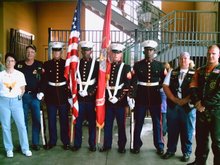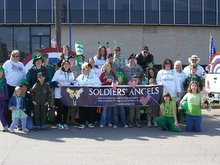There are certain conversations that you never want to have with someone you love. One of those conversations is about the possibility of dying and what that person wants to happen with their money, property and burial. Normally, that's something that you associate with the elderly or the very ill when they are nearing the end of their life. Those conversations are hard enough. But, when you are talking to your brother who is a year younger than you and is in the prime of health, that conversation takes on a whole different context. It brings things home to you about mortality. In this case, it brings the war home to you.
About three years ago, my brother called me, out of the blue, during the work day. That was pretty unusual. Usually, we talked about every two weeks on a Saturday or Sunday. We would catch up on what the family was doing, how is kids were, his wife, what we were doing here. All the usual things that families do when they live so far apart. On this day, we did the same.
He told me about going to a military funeral with full honors for a man who had served long and unexpectedly died at home from a heart attack. He was asked to be part of the honor guard. He wore full military dress in the blazing heat of an early summer day in the desert. He talked about sweating so badly he had to have his uniform dry cleaned immediately. Then he said something odd, "If something happens to me, that's what I want." I asked, "Really?" Because I always thought my brother was pretty laid back regardless of his career. He replied, "Hell, yes! I want those SOBs to sweat like I had to. Maybe they'll remember!" I thought that was an odd statement, but I laughed a little and told him he was going to be a pain even after death.
After we had a few more laughs and harassed each other a little, as siblings are want to do, he said, "I'm deploying in three days." Just like that. It is not melodramatic to say that for a moment everything stops and your mind goes blank.
We had been at war in Afghanistan for two years and Iraq for almost exactly one. The possibility of deploying was always there, but it is not something that you dwell on. Life still goes on here, even as it does there. I wanted to know all the things that everyone wants to know, but I knew better than to ask: where? how long? why? What I really wanted to know was when he found out. It is not really usual to find out only three days before hand.
He had known for over two weeks. His response was that he was dealing with his wife, the kids, the paperwork, preparation for deployment, etc, and, well, "you know how mom will be. And, Dad, well..." My parents are both proud of my brother and his service, but having your child deploy to a war zone, no matter how old, no matter how proud, is an emotional roller coaster at best. He hadn't told either of them yet. I knew because, if he had, my mom and dad would have called me already. Not that I didn't understand why he waited. I realized that he was getting himself ready and felt that he was not ready to deal with that emotion.
To make matters more interesting, my brother's unit was not deploying. He had volunteered to go as an individual replacement for someone who had been killed several weeks earlier by a mortar attack. His wife was not enthused by his decision. She didn't understand why he would want to volunteer to go. His general response to all inquiries:
"I am no one special. There are men and women there right now who are away from their families for years at a time. Some of them are young and have not even had much of a life with their families. I have had a great life. My family is well provided for. If I go, someone else may not have to. Someone else can be at home with their family, at least for awhile longer. Maybe, they never have to go."
That was my brother? The younger brother who I had fought with as children? The brother I had competed with for grades, for friends and for the coolest car? The brother that would tell me the wild things that he and his military friends got up to while they were stationed in South Korea? Suddenly, I was no longer the mature, wiser, older sibling. Suddenly, my younger brother was my hero.
Then he said the words that no one wants to hear from their younger brother, "I want you to do something for me." I knew without his asking what it would be and, at that moment, I felt the most proud, the most honored, the most privileged and the most wretched I had ever felt in my life.
We started talking in euphemisms: "if something happens." Neither of us were actually willing to say what the final "something" might be, but it had to be discussed. He said he thought that, "if something happened", his wife, our parents, would be a mess and unable to handle it. We went through his life insurance, the property, what he wanted for his family, what he wanted for himself. I remembered our earlier conversation and that part where he said, "Maybe they'll remember."
Remember him. Remember that war is serious business. Remember that they did not join the Boy Scouts, but a dangerous occupation. Remember to do everything possible to come back alive and bring your men back alive so that your widow was not sitting there crying and your friends would not be standing there sweating in the desert heat. Remember.
When we hung up the phone, I sat there for a long time doing nothing. My mind kept going over what I would need to do. I had wanted to go down and be with his wife and kids when he deployed, but he told me to save my days off, "just in case." I knew that, soon, my mom would call and my dad would call and I would have to be strong and supportive. I would have to tell them the same thing, over and over again, that my brother had told me: he volunteered because he wanted to do it. I was going to support him every way I could while he was away so he could do his job and come home.
Before, the war had been on television. The people there were somebody else's sons and daughters, brothers and sisters, mothers and fathers. They were not "my family". They were not people that I knew. They were the "others" with barely any connection to me. Now, I wanted to know everything. In two days, I read more books, more newspapers, watched more news than I had ever done in such a short time. I started thinking about all the others that were there. I realized that the conversation I had with my brother must go on hundreds of thousands of times as men and women were deployed to each theater of combat.
I wondered if they had a family like ours. I wondered if they had to worry about their family back home. I wondered if anyone called, or wrote or sent a little something to let them know that someone cared that they were there. I've never been the kind of person to sit back and do nothing. I didn't want to just wait until "something happened". I needed to do something now. But, what?
In an odd twist of fate, my brother was not deployed. Another man with the same rank, who had "been there", had all his shots and all his paperwork in order had put in and been accepted for the billet first. My brother was disappointed. There were no other billets open at the time for his MOS (military operations specialty). When he called on the day he was to deploy and told the family, I could feel the big sigh of relief that came out of everyone. It was like letting the air out of an over inflated balloon. When I spoke to my brother, I could tell that he was not relieved. I knew some of what he was feeling. This man, whose name I still do not know, went and my brother did not. I don't know if he had a family. I don't know what ever happened to him. What I know is, he did what my brother was going to do. He went and someone else did not have to.
I realized that, just because my brother didn't go, it didn't mean that there weren't thousands of men and women who needed support. They were no longer the "others". They were somebody to someone. They were people that we knew. They were OUR people. So, I decided I still had to do something.
I continued to look for organizations that provided support. I went on line and found the "milblogging" community. Military men and women, serving and veterans, who had websites and personal journals. One of those websites was Blackfive.net. He wrote about an organization called Soldiers' Angels. They did direct support for the troops including care packages and letters. That's what I wanted to do. I wanted to personally show our troops that they had someone here pulling for them, someone who cared.
I wrote once that I wish I could answer "no" to the inevitable question I am asked when talking about Soldiers' Angels: "do you have someone in the military". I wanted to be able to talk from the position of a civilian with no military connection in hopes that it would resonate more with the public. I was completely wrong. I will never answer "no", even if my brother retires someday. I do have "someone" in the military; a lot of "someones". Those that serve are "our" people, they are "my people" and they always will be.
Please help Soldiers' Angels support our troops. Adopt a soldier, sailor, airman or marine today. Let them know that they are somebody's someone.  - May no soldier go unloved
- May no soldier go unloved
Thursday, July 19, 2007
Why I Became an Angel: The Phone Call
Posted by Kat at 5:52 AM
Labels: Family, Soldiers' Angels
Subscribe to:
Comment Feed (RSS)


 Soldiers' Angels: Adopt a Soldier
Soldiers' Angels: Adopt a Soldier











|